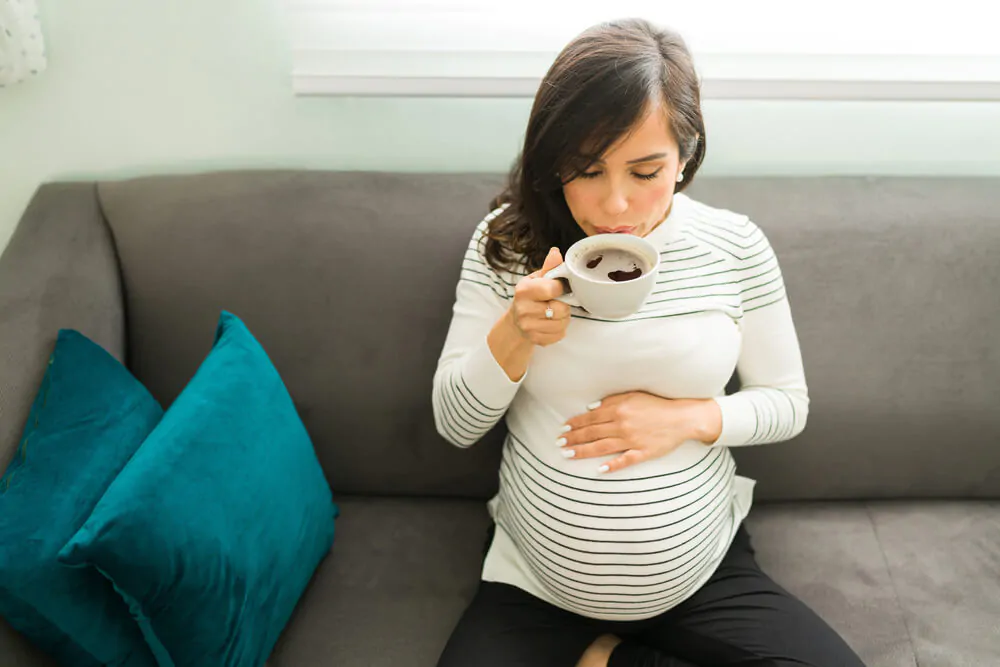Can you drink decaffeinated coffee while pregnant? Is this safe for you and your unborn child? What do you need to know?

You may not be used to tracking or caffeine consumption; however, if you are pregnant or planning on becoming pregnant, you may be worried about your risk of miscarriage. A lot of pregnant women switch to decaf coffee while pregnant in an effort to protect themselves and their unborn children.
If you are someone who is used to drinking coffee in the morning, you should monitor your caffeine content intake. You might be surprised to hear that the caffeine content of decaffeinated coffee is not usually zero, despite the decaffeination process.
Is regular coffee or caffeine in coffee bad for you during pregnancy? Is it better to drink decaffeinated cups of coffee instead? Learn more about what a cup of decaf might do for you during pregnancy.
If you have questions, talk to your OB-GYN for professional medical advice.
The Impacts of Caffeine During Early Pregnancy: ACOG
If you are pregnant are planning on becoming pregnant, you want to minimize the chances of birth defects, particularly during the first trimester. According to the American College of Obstetrics & Gynecology (ACOG), research suggests that moderate caffeine consumption does not increase your miscarriage rate or risk of preterm labor. ACOG defines moderate caffeine consumption at 200 mg or less.
A typical 12 oz cup of coffee has 200 milligrams of caffeine. Of course, you want to check the coffee brand closely to be sure how much caffeine is present.
Remember that the amount of coffee is different from caffeinated beverages. Caffeine is also present and soft drinks, energy drinks, chocolate, and green tea. If you are someone who combines coffee with any of these other foods or beverages, you need to track your total caffeine consumption.
Remember that caffeine can impact you while pregnant as well. For example, caffeine can interfere with your sleep cycle. It can also contribute to lightheadedness and nausea.
Finally, caffeine can also act as a diuretic, leading to dehydration. Be sure to check all irrelevant guidelines regarding nutrition during pregnancy. That way, you can make the right decisions for yourself and your unborn child.
What Happens if You Drink Too Much Caffeine While Pregnant?
Unfortunately, if you drink too much caffeine while pregnant, this can have an impact on the health of your baby. Caffeine can cross the placenta. Even though your liver can break down caffeine, the digestive system of your unborn child might not be able to do the same.
If your unborn child is exposed to too much caffeine, there are a number of medical issues that could arise, particularly as it relates to fetal growth. Excess caffeine could lead to low birth weight, growth restriction, and other chronic medical problems. Therefore, you need to monitor your caffeine intake closely.
What About Decaffeinated Coffee?

If you are thinking about swapping out your standard cup of joe for decaffeinated coffee, you may think you are in the clear. On the other hand, even decaffeinated coffee still has some caffeine in it, despite the name.
Of note, decaffeinated coffee has significantly less caffeine than regular coffee. One cup of decaffeinated coffee (which is 240 mL) has just over 2 mg of caffeine. If you are someone who prefers espresso, one espresso (which is 60 mL) has approximately 0.6 mg of caffeine.
If you are pregnant, you need to monitor exactly how much caffeine you are drinking. If you make your coffee yourself, you can control exactly how much caffeine you are consuming. On the other hand, if you get your coffee from a coffee shop, and it is made by a barista, you may not know exactly how much caffeine is present.
For example, commercial decaffeinated coffee may still have as much as 14 mg of caffeine in a single 16 oz serving. You may consume far more caffeine than you intend.
Final Word on Decaffeinated Coffee While Pregnant
If you want to be as safe as possible, you should try to avoid caffeine while pregnant. If this is important for your overall quality of life, remember that the American College of Obstetrics and Gynecology recommends that you limit your daily caffeine intake to 200 mg. Therefore, you should check the caffeine content of your coffee closely.
Keep in mind that there are lots of foods and beverages that contain caffeine. Other common examples include soft drinks, energy drinks, and chocolate. You need to total your caffeine intake across all sources to track it properly.
Finally, decaffeinated coffee is not necessarily caffeine-free. Be sure to read the labels and be careful if you get your decaf coffee from a coffee shop. It may contain more caffeine than you think.
FAQs About Decaffeinated Coffee While Pregnant
Is caffeine bad for my unborn baby?
Caffeine can cross the placenta. Even though your body can break down caffeine, the body of your unborn child cannot. If you consume too much caffeine, this could have an impact on the birth weight of your child.
There might be other long-term medical effects as well. You should track your caffeine intake closely.
How much caffeine is too much?
The effects of caffeine are an area that is still being actively being researched. ACOG recommends that you limit your daily caffeine intake to 200 mg. Remember that caffeine is found in multiple foods and beverages.
You should total your caffeine intake from all sources.
Can I drink decaf coffee instead?
If you would like to be on the safe side, you should switch to decaf coffee. Keep in mind that there is still a minimal amount of caffeine in decaf coffee. If you make your decaf coffee yourself, you should be safe.
On the other hand, always ask to see the nutrition facts if you are purchasing decaf coffee from a commercial establishment. You may be surprised at how much caffeine is present.
